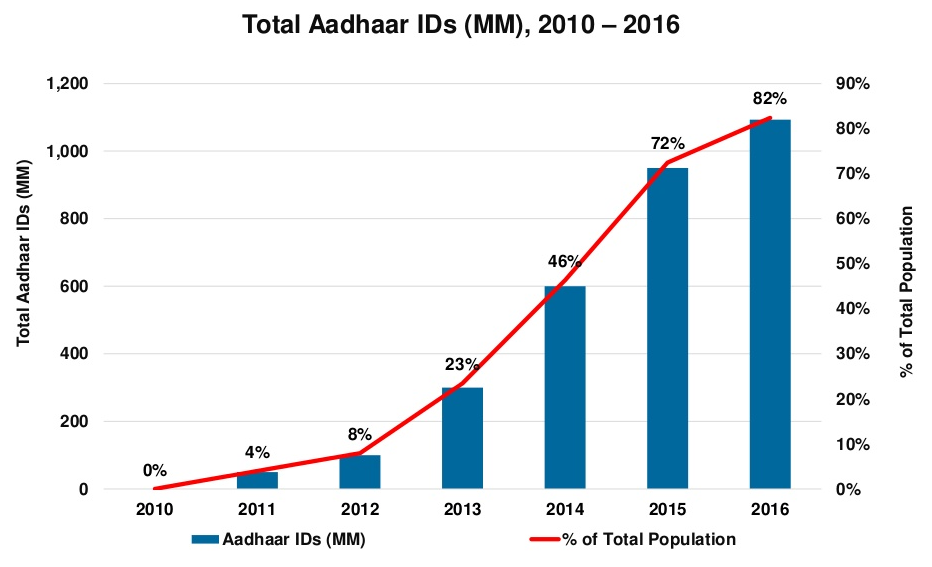
India’s colorful festival of Holi. Photo credit: FaceMePLS.
India is in the midst of a digital transformation, with a nudge and a shove from the government. And it’s provoking extreme reactions – from activists who have challenged it in the country’s highest court to high profile tech evangelists who swear by it. How this plays out could have a huge impact on consumers and the tech startup ecosystem.
The transformation began with a mobile internet explosion. The influx of affordable smartphones from China set it off a couple of years ago. The latest spark is the rollout of a 4G network with affordable data packs by a new telecom operator, Reliance Jio.
Mukesh Ambani, chairman of Reliance Industries, who is also the richest man in the country, poured US$25 billion into laying out a 4G network and disrupting telecoms. Free data for an initial period was the hook to make users shift from other networks, which had started slashing prices even before Jio’s launch.
Within six months of its launch, Jip signed up over 100 million customers using the Aadhaar ID for authentication.
The key to its success would lie in the speed and scale of its adoption. And within six months of its launch in September last year, Jio signed up over 100 million customers. That’s seven new customers every second.
The secret to such a scorching pace – apart from the obvious eagerness of people to sign up for the data bonanza – lies in a biometric digital identity system called Aadhaar.
Aadhaar assigns a unique number and QR code to every citizen after taking their photographs, fingerprints, retina scans, and proofs of address and identity. Public-spirited tech evangelists – such as Nandan Nilekani, billionaire co-founder of IT giant Infosys – worked with the government to create a scalable infrastructure for it.
Today, more than a billion Indians are on this database. What’s more, Aadhaar has an open API (application programming interface) that can be called on to authenticate a person’s identity.
Sanjay Jain, an ex-Googler who worked with Nilekani on Aadhaar from its formative stage, informs Tech in Asia that 900 million such authentication calls were made in the month of July – that’s 30 million a day on average. Jain, who holds a masters degree in computer science from UCLA, was responsible for creating Google Map Maker, integrated in Google Maps. Now he’s helping build the so-called India Stack, whose primary layer is Aadhaar.

Source: Mary Meeker Internet Trends Report 2017.
Paperless onboarding of customers
Around a quarter of the authentication calls being made with an Aadhaar ID are for a digital KYC (know your customer) – the next layer of the India Stack. With this e-KYC, most of the time-consuming paperwork required for onboarding customers by a bank or telecom operator are going out of the window. That’s how it takes Jio just three minutes on average to issue a new SIM card.
The business use cases for this are many because now anybody with a smartphone and Aadhaar ID can provide two-factor authentication and enable a host of faster digital transactions. But it needed a Jio use case to show the size and speed of scaling that such a system can support, and how fast it can disrupt an existing way of doing business.
900 million Aadhaar ID authentication calls were made in the month of July – that is, 30 million a day on average.
Digital lending, for example, is a fast-emerging area, with dozens of companies trying out new business models thanks to their new-found ability to authenticate a person’s identity with an API call to a trusted government database. That’s not only quicker but also much cheaper than traditional systems, making a startup such as ZestMoney viable, explains its co-founder and CEO, Lizzie Chapman. ZestMoney partners with ecommerce companies to provide credit at checkout for the vast majority of Indians who don’t use a credit card.
Apart from startups, banks are also keen to hop on the bandwagon. The cost of onboarding a customer for something like a mutual fund, for example, is suddenly a tiny fraction of what it used to be, thanks to the Aadhaar-based authentication, points out Varad Pande, partner at Dalberg Global Development Advisors. He had worked with the government earlier to develop use cases for Aadhaar.
“Right now, if you ask mutual fund companies, the requirements to onboard somebody to a mutual fund cost them something like US$24. Using India Stack, you can bring that down by a factor of 10. So you can imagine that the minimum ticket price at which it starts becoming attractive for a mutual fund to have a customer comes down dramatically,” Pande explains to Tech in Asia.
See: 11 young fintech startups playing with disruptive tech in India
One of the early hooks for the government’s unique identity project was to transfer subsidies for cooking gas directly to Aadhaar-linked bank accounts. You buy the gas at market rates, and claim the subsidy benefit. This helps to limit subsidies to eligible beneficiaries and cut leakages. Now the government intends to eliminate the cooking gas subsidy altogether by March next year, and provide free supplies to women in households below the poverty line authenticated by their Aadhaar ID.
There are more than 150 other subsidies in India with social objectives – such as those on kerosene and fertilizers. A large percentage of them don’t reach their intended beneficiaries. Aadhaar-linked systems to eliminate them or direct them better could potentially save billions of dollars each year for the government exchequer. This would in turn free up resources for investment in much-needed infrastructure for economic growth.
Concerns over privacy and security
More and more parts of the public system are being linked to Aadhaar. The potential benefits for government, business, and citizens are many, and startups are exploring ways to use it in different domains from fintech to healthcare. But there are also new challenges, and these mainly relate to privacy and security.
Activists took the government to court, challenging the mandatory linkage of the Aadhaar ID to everything from social schemes to bank accounts and income tax. They argued that such a database could lead to a surveillance state and also risk theft of personal information. The government countered that the right to privacy could not be sweeping; it had to be balanced by the needs of a developing nation.
India’s Supreme Court ruled that citizens have a fundamental right to privacy, and it was part of the constitutionally guaranteed right to life and liberty.
Last month, India’s Supreme Court ruled that citizens have a fundamental right to privacy as part of the constitutionally guaranteed right to life and liberty. Now hearings on the validity and scope of the Aadhaar program, which was passed into law by an act of parliament, will resume in that context. It will determine to what extent the government can restrict the right to privacy for social objectives.
The court will also look at safeguards for protection of citizens’ personal data stored on the government’s digital ID database. Just last month, a software engineer of Ola – Uber’s main rival in India – was arrested for allegedly providing access to the database through a mobile app. He is even reported to have demonstrated to investigators just how easy it was to see anybody’s Aadhaar data.
The government has authorized a variety of agencies to access the database and provide authentication for Aadhaar IDs. One of these is a hospital, whose server the accused techie, Abhinav Srivastava, linked to his app. Srivastava holds a master’s degree in engineering from premier college IIT Kharagpur. Ola acquired his startup, Qarth, but denied any knowledge of the unauthorized access to ID data.
Other serious breaches have surfaced. In July, the Aadhaar IDs, names, addresses, and bank account details of more than a million people in the state of Jharkhand became public on the its social security department’s website. Aadhaar IDs are required to be linked to bank accounts in order to avail of government benefits, and a large number of pensioners had done so. A glitch exposed the entire data.
When asked about rising concerns over data security, Sanjay Jain told Tech in Asia he did not see that as being specific to Aadhaar and its related infrastructure. “I think it’s important that these [concerns] are taken in perspective,” he said. “Every entity that’s providing services digitally has to manage their own data security… We want to hold every entity that is building a digital system to be completely accountable for the data they gather from the user.”
What’s different about Aadhaar is its sheer scale, with over a billion IDs and hundreds of millions of bank accounts already linked with them. It is the lynchpin for a range of digital infrastructure being developed around it – from authentication of customers to e-signatures, digital lockers for documents, and a unified payments interface. Taken as a whole, this is called the India Stack. No other country has attempted a public digital infrastructure in such an integrated manner.
See: Payments interface got lukewarm response, but now there’s a race to adopt it
In the second part of this article tomorrow, we will look at the opportunities that the unified payments interface is opening up for young startups as well as more established players like Uber and WhatsApp. And, as with any new tech, tricky issues emerge even as new use cases emerge.
This post A crash course on India’s digital ID: why it has such staunch believers and fierce critics appeared first on Tech in Asia.















 Artificial intelligence (AI) has been a watchword for scientists, innovators, and entrepreneurs as of late. Some, like Elon Musk and Stephen Hawking, decry the potential apocalypse that undeterred AI technology can bring. Meanwhile, companies like Samsung and Google celebrate AI as the pinnacle of our future.
Artificial intelligence (AI) has been a watchword for scientists, innovators, and entrepreneurs as of late. Some, like Elon Musk and Stephen Hawking, decry the potential apocalypse that undeterred AI technology can bring. Meanwhile, companies like Samsung and Google celebrate AI as the pinnacle of our future. Thousand-page documents are banes of our existence. Who has the time to pore over every single word? Flax Scanner, a solution developed by
Thousand-page documents are banes of our existence. Who has the time to pore over every single word? Flax Scanner, a solution developed by  To a simple computer, a photo is a random assortment of pixels with varying degrees of RGB values. But with
To a simple computer, a photo is a random assortment of pixels with varying degrees of RGB values. But with  Learning new languages has evolved from simply reading foreign dictionaries to apps that teach us new words in progressive difficulty. Through
Learning new languages has evolved from simply reading foreign dictionaries to apps that teach us new words in progressive difficulty. Through  In higher echelons of education,
In higher echelons of education, 

















